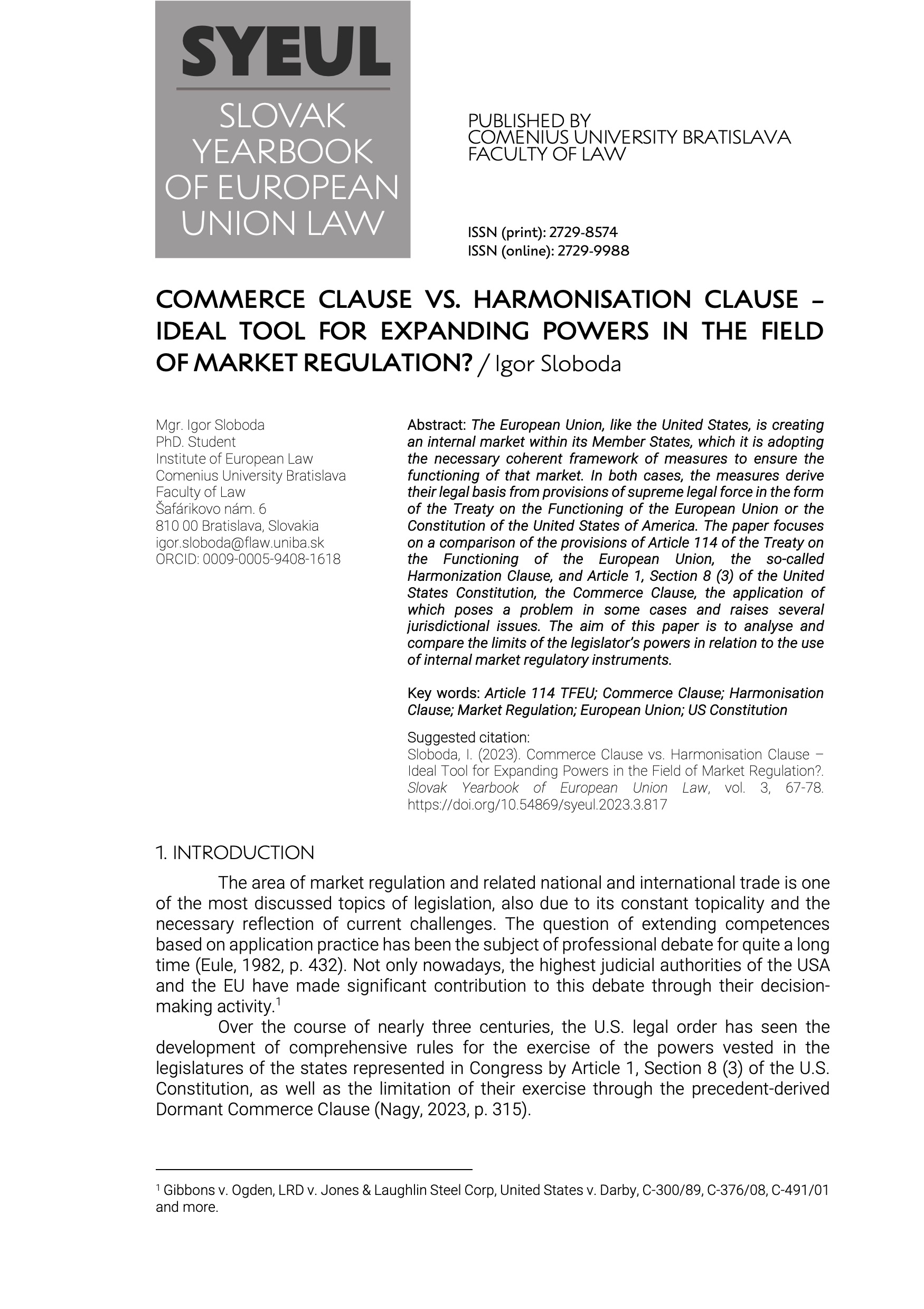Commerce Clause vs. Harmonisation Clause – Ideal Tool for Expanding Powers in the Field of Market Regulation?
DOI:
https://doi.org/10.54869/syeul.2023.3.817Keywords:
Article 114 TFEU, Commerce Clause, Harmonisation Clause, Market regulation, European Union, US ConstitutionAbstract
The European Union, like the United States, is creating an internal market within its Member States, which it is adopting the necessary coherent framework of measures to ensure the functioning of that market. In both cases, the measures derive their legal basis from provisions of supreme legal force in the form of the Treaty on the Functioning of the European Union or the Constitution of the United States of America. The paper focuses on a comparison of the provisions of Article 114 of the Treaty on the Functioning of the European Union, the so-called Harmonization Clause, and Article 1, Section 8 (3) of the United States Constitution, the Commerce Clause, the application of which poses a problem in some cases and raises several jurisdictional issues. The aim of this paper is to analyse and compare the limits of the legislator’s powers in relation to the use of internal market regulatory instruments.
References
Books and Chapters:
Chemerinsky, E. (2015). Constitutional Law Principles and Policies. New York: Wolters Kluwer. ISBN 978-1-4548-6092-1.
Egan, M. P. (2015). Single Markets: Economic Integration in Europe and the United States. Oxford: Oxford University Press. DOI: https://doi.org/10.1093/acprof:oso/9780199280506.001.0001 DOI: https://doi.org/10.1093/acprof:oso/9780199280506.001.0001
Kaczorowska, A. (2016). European Union Law. London: Routledge 2016. ISBN 978-1-315-56103-5.
Schütze, R. (2014). Limits to the Union’s Internal Market Competence(s): Constitutional Comparision’s. In: L. Azoulai (ed.), The Question of Competence in the European Union (pp. 215-233). Oxford: Oxford University Press. DOI: https://doi.org/10.1093/acprof:oso/9780198705222.003.0011 DOI: https://doi.org/10.1093/acprof:oso/9780198705222.003.0011
Articles and Studies:
Boykin, S. (2012). The Commerce Clause, American Democracy and the Affordable Care Act. Georgetown Journal of Law and Public Policy, 10(1), 89-114. Available at SSRN: https://ssrn.com/abstract=3827498 (accessed on 31.12.2023).
Eule, J. N. (1982). Laying the Dormant Commerce Clause to Rest. The Yale Law Journal, 91(3), 425-485. DOI: https://doi.org/10.2307/795926 (accessed on 31.12.2023). DOI: https://doi.org/10.2307/795926
McGinnis, J. and Somin, I. (2004). Federalism vs. States Rights: A Defense of Judicial Review on a Federal Systém. Northwestern University Law Review, 99(1), 89-130. Available at SSRN: https://ssrn.com/abstract=578143 (accessed on 31.12.2023).
Nagy, C. I. (2023). The Dormant Commerce Clause’s Unfulfilled Constitutional Promise to Rule Out Protectionism: Proposal for a New Doctrine. Indiana Law Review, 57(2), 313-356. Available at SSRN: https://ssrn.com/abstract=4661253 (accessed on 31.12.2023). DOI: https://doi.org/10.18060/27978
Pushaw, R. J. (2003). Methods of Interpreting The Commerce Clause: A Comparative Analysis. Arkansas Law Review, 55, 1185-1212. Available at SSRN: https://ssrn.com/abstract=1458005 (accessed on 31.12.2023).
CJEU Case Law:
CJEU, judgement of 11 June 1991, Commission/Council, C-300/89. ECLI:EU:C:1991:244
CJEU, judgement of 5 October 2000, Germany/Parliament and Council, C-376/08, ECLI:EU:C:2009:808
CJEU, judgement of 10 December 2002, British American Tobacco (Investments) and Imperial Tobacco, C-491/01, ECLI:EU:C:2002:741
CJEU, judgement of 6 December 2005, United Kingdom/Parliament and Council, C-66/04, ECLI:EU:C:2005:743
CJEU, judgement of 2 May 2006, Parliament/Council, C-436/03, ECLI:EU:C:2006:277
CJEU, judgement of 12 December 2006, Germany/Parliament and Council, C-380/03, ECLI:EU:C:2006:772
CJEU, judgement of 8 June 2010, The Queen, Vodafone Ltd, Telefónica O2 Europe plc, T-Mobile International AG, Orange Personal Communications Services Ltd/Secretary of State for Business, Enterprise and Regulatory Reform, C-58/08, ECLI:EU:C:2010:321
CJEU, judgement of 22 October 2013, Commission/Council, C-137/12, ECLI:EU:C:2013:675
SCOTUS Case Law:
SCOTUS, Gibbons v. Ogden, 22 U.S. 1 (1824)
SCOTUS, NLRD v. Jones & Laughlin Steel Corp., 301 U.S. 1 (1937)
SCOTUS, United States v. Darby, 312 U.S. 100 (1941)
SCOTUS, Wickard v. Filburn, 317 U.S. 111 (1942)
SCOTUS, Katzenbach v. McClung, 379 U.S. 294 (1964)
SCOTUS, Maryland v. Wirtz, 392 U.S. 183 (1968)
SCOTUS, Perez v. United States, 402 U.S. 146 (1971)
SCOTUS, United States v. Lopez, 514 U.S. 549 (1995)
SCOTUS, United States v. Morrison, 529 U.S. 598 (2000)
SCOTUS, Gonzales v. Raich, 545 U.S. 1 (2005)
SCOTUS, National Federation of Independent Business v. Sebelius, 567 U.S. 519 (2012)
SCOTUS, Tennessee Wine and Spirits Retailers Association v. Thomas, 588 U.S. (2019)
Legislation:
Treaty on European Union
Treaty on the Functioning of the European Union
Constitution of the United States
European Commission, Proposal for a Regulation of the European Parliament and of the Council on contestable and fair markets in the digital sector (Digital Markets Act), COM(2020) 842 final, 15.12.2020

Downloads
Published
Issue
Section
License
Copyright (c) 2024 Slovak Yearbook of European Union Law

This work is licensed under a Creative Commons Attribution-NonCommercial 4.0 International License.
The Author(s) transfers copyright to the Article to the Publisher of the Journal by the Licence Agreement.
The Author(s) retains rights specified in the Licence Agreement.
The readers may read, download, copy, distribute, print, search, or link to the full texts of all of the Article of the Journal and use them for any other lawful purpose under specified Creative Commons Licence (CC BY-NC).

